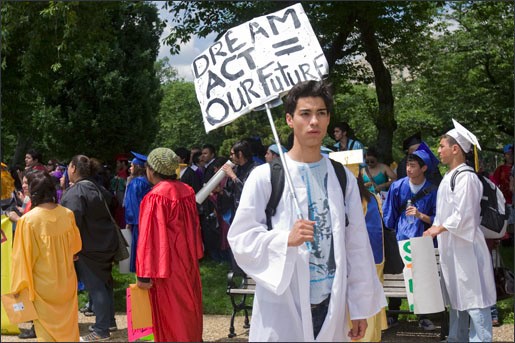Senate postpones DREAM Act vote

Courtesy photo / Google Images DREAM act
Dec 13, 2010
Last week, the U.S. Senate voted again to table the Development, Relief and Education for Alien Minors (DREAM) Act, which would provide a path to U.S. citizenship for some foreign-born high school graduates who immigrated illegally as children.
The DREAM Act, first introduced to Congress in 2001, has been reworked and revised a number of times. The bill was reintroduced late Thursday. It passed the House with a 216-198 vote before a filibuster led by Senate Majority Leader Harry Reid (D-Nev.) halted the legislation.
The DREAM Act would allow illegal immigrants with a high-school diploma or a GED to apply for a six-year conditional citizenship if they are under 30 and came to the U.S. before turning 16. Current policy dictates any child brought into the country without an immigration visa first must leave the U.S. and return to their birth country to apply. Even then, citizenship is not always guaranteed.
The DREAM act would require those requesting temporary citizenship to either be enrolled in a four-year college or university and obtain a degree in good academic standing or complete two years in the U.S. military and finish a term with an honorable discharge.
“We support the DREAM Act because it would further the efforts of institutions of higher education nationwide to seek and welcome students from diverse backgrounds and experiences by providing the students who have met the act’s requirements with access to financial aid,” said Dwight Hamilton, assistant vice president for affirmative action at Grand Valley State University.
Although the bill would not provide student immigrants with access to federal higher education grants, such as Pell grants, they would be eligible to apply for student loans and work study.
“It will be a positive move for the few undocumented students at GVSU as they graduate and move on in their professional and personal lives,” said Kate Stoetzner, director of International Students and Scholars.
Stoetzner said that a student does not mark “U.S. citizen” or “permanent resident” on their admissions application, the student will then be asked if they need assistance with their immigration status.
“Those that may be undocumented are given the opportunity to apply for legal F-1 student status,” she said.
Although university officials said they cannot estimate the potential impact the DREAM act will have on GVSU if it passes, college campuses around the nation may see a boom in the enrollment of foreign-born students due to the bill’s stipulations.
Republican critics argue the DREAM Act encourages illegal entry, essentially granting illegal immigrants amnesty or “free entry.”
President Barack Obama backed the immigration reform in a statement after the bill passed through the House.
“This vote is not only the right thing to do for a group of talented young people who seek to serve a country they know as their own by continuing their education or serving in the military, but it is the right thing for the United States of America,” he said.
The DREAM Act will remain tabled until next week.























